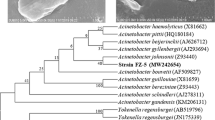Abstract
Two thermophilic anaerobic bacterial consortia (ALK-1 and LLNL-1), capable of degrading the aromatic fuel hydrocarbons, benzene, toluene, ethylbenzene, and the xylenes (BTEX compounds), were developed at 60 °C from the produced water of ARCO'S Kuparuk oil field at Alaska and the subsurface water at the Lawrence Livermore National Laboratory gasoline-spill site, respectively. Both consortia were found to grow at 45–75 °C on BTEX compounds as their sole carbon and energy sources with 50 °C being the optimal temperature. With 3.5 mg total BTEX added to sealed 50-ml serum bottles, which contained 30 ml mineral salts medium and the consortium, benzene, toluene, ethylbenze, m-xylene, and an unresolved mixture of o- and p-xylenes were biodegraded by 22%, 38%, 42%, 40%, and 38%, respectively, by ALK-1 after 14 days of incubation at 50 °C. Somewhat lower, but significant, percentages of the BTEX compounds also were biodegraded at 60 °C and 70 °C. The extent of biodegradation of these BTEX compounds by LLNL-1 at each of these three temperatures was slightly less than that achieved by ALK-1. Use of [ring-14C]toluene in the BTEX mixture incubated at 50 °C verified that 41% and 31% of the biodegraded toluene was metabolized within 14 days to water-soluble products by ALK-1 and LLNL-1, respectively. A small fraction of it was mineralized to 14CO2. The use of [U-14C]benzene revealed that 2.6%–4.3% of the biodegraded benzene was metabolized at 50 °C to water-soluble products by the two consortia; however, no mineralization of the degraded [U-14C]benzene to 14CO2 was observed. The biodegradation of BTEX at all three temperatures by both consortia was tightly coupled to sulfate reduction as well as H2S generation. None was observed when sulfate was omitted from the serum bottles. This suggests that sulfate-reducing bacteria are most likely responsible for the observed thermophilic biodegradation of BTEX in both consortial cultures.
Similar content being viewed by others
Author information
Authors and Affiliations
Additional information
Received: 12 July 1996 / Received revision: 31 December 1996 / Accepted: 31 January 1997
Rights and permissions
About this article
Cite this article
Chen, CI., Taylor, R. Thermophilic biodegradation of BTEX by two consortia of anaerobic bacteria. Appl Microbiol Biotechnol 48, 121–128 (1997). https://doi.org/10.1007/s002530051026
Issue Date:
DOI: https://doi.org/10.1007/s002530051026




